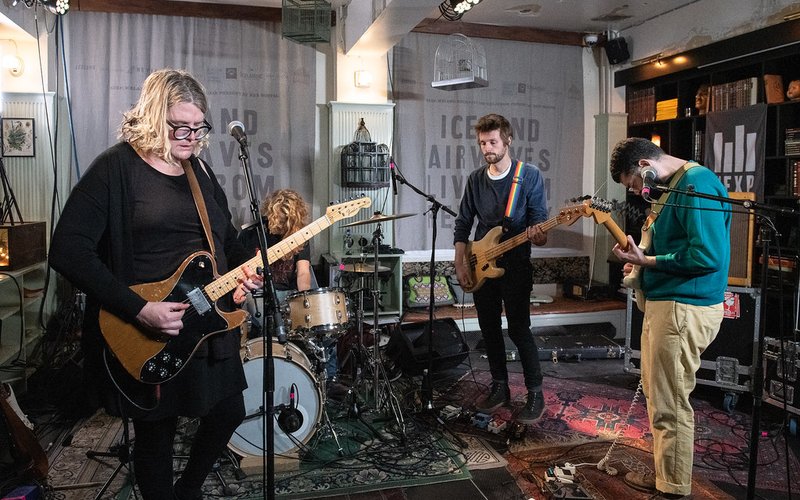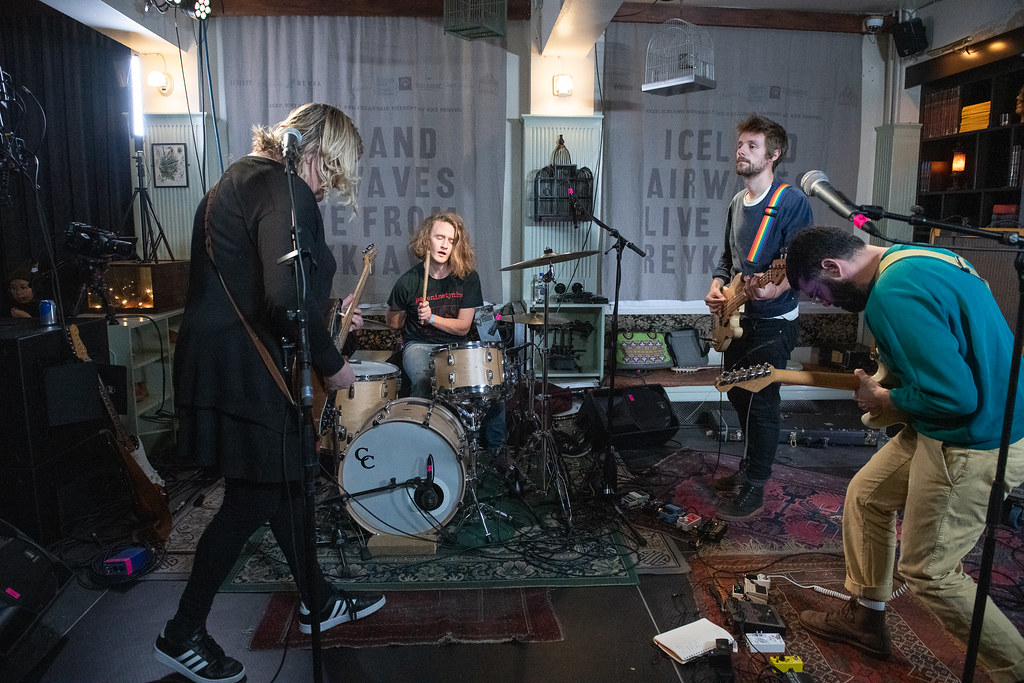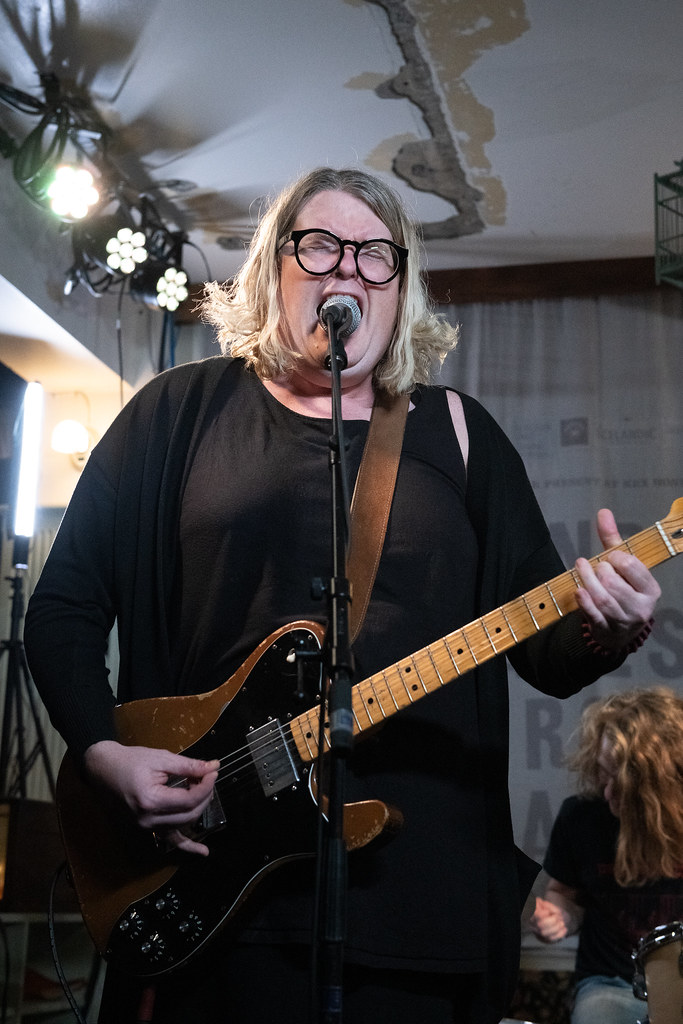
From the basements of Reykjavik’s DIY scene, meet your new favorite Icelandic band, Laura Secord. Fronted by Alison MacNeil (formerly of Kimono), the band moves with the righteous aggression and tenderness of second-wave emo, the patience of slowcore, and spellbinding camaraderie that’s all their own. When the band comes together, there’s a fiery intensity that enraptures any room they play in. See for yourself in the video from their set at Kex Hostel during Iceland Airwaves 2019 below.
Calling them an “Icelandic band” is not super accurate (and yes, they’re a band, not a solo project of the Canadian war hero). They’re a band without a singular hometown, with members hailing from Iceland, Canada, Germany, and the United States. Though only two members currently reside in Reykjavik, the band has managed to find a way to routinely come back together. It’s a testament to their commitment to this project and the wondrous magic that happens when they come together.
While Laura Secord certainly can’t embody all of the varied sounds and ideas currently working in Reykjavik’s DIY scene, the adventurous and supportive spirit emanating from them is certainly embolic of what the community’s all about. Drummer Ægir Sindri Bjarnason runs the basement venue R6013 as well as the label Why Not? Plötuútgáfa!. It was at R6013 that the band first came together and where I first personally experienced the mighty dynamics this band wields.
MacNeil’s feverish songwriting and distorted howls and Bjarnason’s thunderous drums collide with guitarist Erik DeLuca’s rippings riffs and Julius Rothlander’s barraging bass drones. When you hear them together, you can understand the desire to make a “long-distance band” work. There’s something special that happens with this lineup in the same room. After their rousing set at KEX Hostel, we caught up with the band to talk about their beginnings, recording their debut LP Ending Friendships during a snowstorm, ghosting, and how they make the band work with members spread out across the globe.
KEXP: What led to you all coming together for Laura Secord?
Alison MacNeil: So Ægir has a venue in his basement and I was doing an acoustic show. Then Erik was playing with this other band B'CHU and I liked his guitar tone.
Ægir Sindri Bjarnason: And that was that band's last show. We were both at that show and you both wanted to play together. I think you both asked me to put you two in touch with each other with the idea of starting a new band and we got really excited about that idea.
MacNeil: And you [bassist Julius Rothlander] were doing sound that night, right?
Erik DeLuca: We were all there at that one show.
Bjarnason: We just kinda slid into the band.
DeLuca: Well, also when I moved here I saw I Ægir play in many projects and I was always like, 'Damn, that guy can play the drums!' I never, ever imagined, like playing in a band with him. And then when I saw Alison play at the basement, her songs also were so touching. I never thought I could play in a band with them. But now we're in a band, and I'm sure Julius probably feels the same way. Like, these are the two rock stars and then Julius and I are just kinda like slackers.
MacNeil: I used to always see Ægir and his brothers at Kimono shows. I remember once at [??? venue name?] I referred to you guys as the Jonas Brothers of Icelandic hardcore [laughs], just because they're brothers.

You mentioned the House show. That's where you first met and that's where I first heard Laura Secord was at a show there last year. Ægir, I know you run that venue as well. You all seem pretty involved in this DIY underground scene that's happening in this city. Can you talk a little bit about Iceland's DIY scene and what it represents to you and how you take part in it?
DeLuca: There's two ways to do things. The right way and the wrong way. And Ægir, the way that he thinks about this basement's space is the right way. All the right values are being put forth. Making sure that everybody has a hot meal before shows, making sure that the gender balance is even so there are not just a bunch of white dudes playing music. The values are so strong in that space and I think that that's kind of what the core of... Ægir's values are very similar to what the core values of the DIY scene are.
MacNeil: Of course inside that DIY thing, it's also that other people aren't doing things for you. When you're living here in Iceland and you're just making some band and it's expensive to tour, you know, you can't rely on something happening from some outside influence, like somebody coming and just doing everything for you. That just doesn't happen. Or sometimes it happens, but I've seen it happen like three times out of like hundreds of bands.
Bjarnason: I like the freedom that comes from just doing things on your own terms and not needing to go through any other channels before doing whatever you want to do, but just going forward and going for it.
MacNeil: It's a mindset too. It's kind of like people don't think of there being any barrier to... like when we were recording this album, for example, I'd been through it so many times before, trying to do everything myself or doing it with like the people who were here. But there's also a mindset here of 'Well, we want somebody to mix the album. We'll just look up our favorite albums and then email the people who were mix engineers.' So there's that kind of thing, too. It's not necessarily DIY only because that's maddening and takes forever to finish any project. Sometimes it's good to just find the right people. Take initiative but also not thinking, 'Oh, we can't contact that person because they're out of our league' or whatever else. In Iceland, people just tend to kind of [be] like, 'Oh, we're on the same level so of course, I can contact that person.'
You just released your first record, Ending Friendships, which was put out on Ægir's label. I read that you recorded it in a cabin during a snowstorm in a remote area. Can you tell me about that experience and why you wanted to get away to work on that record? And I also heard that Alison didn't leave the house for the five days of recording.
MacNeil: [laughs] This is true. I almost didn't stand up from the place except to play guitar and do some stuff. On Wednesday I think we went home and we'd been there since Friday night. It was total cabin fever. I didn't step outside the house the whole time. [Ægir] went for a walk, [Julius] went outside? [Erik] went for a run. I didn't do any of those things.
Bjarnason: I just remember when we were starting to load the car and we started loading the car while Alison was still packing up and I think it was only like just a handful of stuff that was left when Alison went out the door and that was the first time you'd been outside for the whole five days or however long we were there.
MacNeil: Yes. This is a very comfortable situation for me to be in.
Bjarnason: But also it was a good house to be in.
MacNeil: It was! It was great. Wind howling outside and snow blowing everywhere. [In January] we're gonna do it again, but this time we're gonna write songs. Because we don't live in the same country, so we have to organize something to be concentrated and unencumbered by our regular lives.
DeLuca: This is an international band. We're placeless. We're not grounded in any one place. It's both difficult and really inspiring. I mean, where do we live? Julius and I were both living here full time a year ago, or a year and a half ago. And then we both moved on for various work and jobs and things like that. But we've all we've always sort of made it work in different ways, making time, flying in, seeing friends. And also practicing, writing songs.
Ægir's from here, but what brought the rest of you to Iceland? Was it music and art?
MacNeil: I was brought here by an Icelander [laughs]. That's all I have to say about that.
DeLuca: I came here to make art and then I started working at Lístaháskóli, which is the art university.
Rothlander: I was just bored of being in Berlin and needed a new place to stay and then I thought, why not Iceland and Reykjavik? Just quite random.
MacNeil: That's like 99 percent of the foreigners here are like, 'Yeah, I just always wanted to go to Iceland.' I was like the total opposite. I was like, 'Alright, we'll go to Iceland. But can we go somewhere else later?' She was like, 'Yes, yes.' Twenty years later, I'm still here [laughs].
This record is called Ending Friendships, though the band seems deeply rooted in friendships. I'm curious about what the title means to you and what ideas and themes were you exploring in the record?
MacNeil: That was a hard-fought battle [laughs]. So, you know that thing how people ghost each other a lot these days? I was reading this article, I think in The Atlantic, about how people need to almost take the same kind of steps that they do in ending relationships to end friendships because otherwise, they're just leaving people in like this lurch. And it just so happened to be that almost every song on the album was about that. It was just dealing with that idea of how careless we are these days about all of our relationships, whether friendships or intimate relationships.

So there was an actual Laura Secord, who is considered a Canadian war hero from the War of 1812 who crossed from American occupied territory to warn the British of an impending attack. What about that name resonated with you?
MacNeil: Okay, so I thought it would be really funny to have a Canadian band called the ‘Laura Secords’, because 'C chord.' And then Erik said, 'Hey, we should name ourselves a name of something! He has a side project called Marc Von David. So I said, 'Hey, how about Laura Secord?' And everybody went, 'Yay!' And I went, 'Uh oh.' Canadians really get the joke. We've had a lot of questions on Facebook from Canadians, like, 'Are you also making chocolate?' Because it's a chocolate company also.
So that's our big marketing plan is that we're gonna get sued by the chocolate company and then everybody will be like, 'Oh, this new band got sued by the chocolatiers.' But yeah, the story resonates, of course. It's a weird story, though, because it's kind of one of those things that's very apocryphal. You don't really know what happened. There's a version of the story where she walked for 30 miles with a cow so as not to raise suspicion.
But Canadians had 'Heritage Minute' thing that used to be on TV. So, it would come on in between everything else. For one minute you would learn about Canadian history. and one of the ones was Laura Secord and another one [was about] why people wear masks in hockey games and the invention of the snowmobile and stuff like that. It's like a Canadian drinking game to name all the heritage minutes.
I fell in love with their sound the first time I heard you all perform. And it feels like there's maybe elements of like slowcore and the heavier end of indie rock. I especially love the vocal effects you use as well and just the tone all around. How did you start to define the sound of the band and how do you feel like it reflects the music that you're writing?
MacNeil: [When we started] we did a lot just endless playing for months to really to find what kind of sound we wanted to have. It wasn't really conscious.
DeLuca: We were improvising and we would improvise for three hours at a take. And it just felt good and we would leave. There was no goal or ambition to even make songs.
Bjarnason: We just also started this band without having any idea of what we wanted it to sound like. We just knew that these four people wanted to play together but we had no idea what. So we took months to just figure that out and just took the time to play together like whatever we felt like playing and somewhere, eventually we gelled and started making these worlds we were playing into songs.
MacNeil: It's really important to me to hear to have songs that you can sing and play on an acoustic guitar. It's become like that for me. My old band, there was a strong, anti repeating of parts. Now we've embraced the whole A, B, C, B, A kind of thing or whatever we do in songs. Whereas I was used to people being, 'Ugh, choruses. No,' or 'We did that already. It's A, B, C, D, E, F, G, that's how the alphabet goes. That's how the part should be.' I like how we're not afraid to do that.
Bjarnason: But we still do both and it took us like five songs or something to get there.
DeLuca: I've played in many bands but I think because we improvised for so long when Allison and myself started bringing in songs, we would arrange and put together these songs in a matter of 30 minutes because we already had this way of working. And I think the most important part is that we all trusted each other and how they were interpreting the songs and critique from whoever was sort of having a problem with something. We would develop and work through these songs really quickly.
MacNeil: It comes from not living in the same country, too. Now we have to be efficient in what we're doing. So we've got this thing on the horizon, which is January, to go and write new songs. We want to be ready and come with some stuff, too.
DeLuca: Alison, this is a lot of pressure! Do you have stuff?
MacNeil: Yeah! I got stuff! I'm writing.
Bjarnason: I also just really like the idea of being there for a few days all together because we don't really have much of that anymore. Usually, for the last year or something, when we're playing together we're practicing for a show. To just have a few days where we're in the same space and we can just play and figure out what we're doing together.
Watch the band's performance from Iceland Airwaves 2019 and read an exclusive interview .
Our second day at Kex Hostel represented the diverse array of music and nations represented at the festival – from American feminist hip-hop and Finnish post-punk to teenage Icelandic punk and a fiery slowcore act with members from all around the world.
KEXP chats with some of the young artists in Reykjavik building their own DIY scene